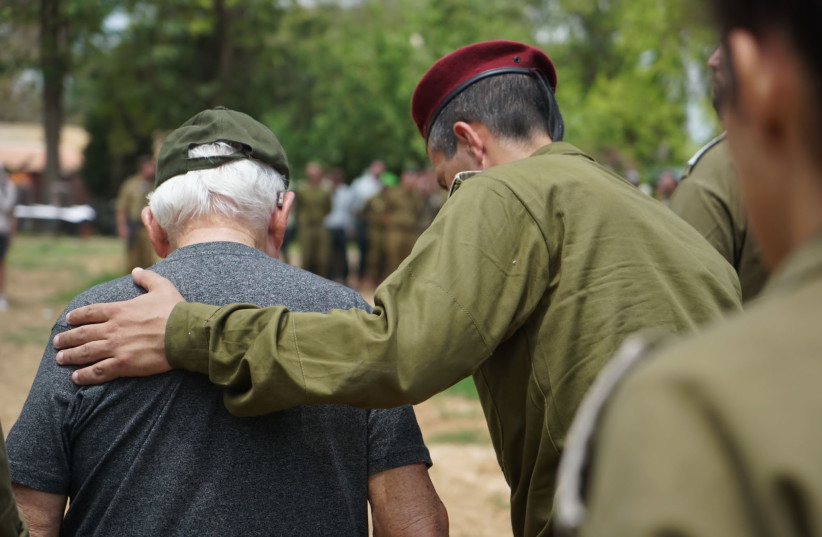Ahead of Remembrance Day for the Fallen of Israel’s Wars, the IDF’s Southern Command is embarking on an extensive project honoring the fighters of the War of Independence with a series of heritage ceremonies and marches as part of Operation LaOrem (Following their Path).
Cpt. Adi Perry, education officer in the IDF’s 80th Edom Division in the Southern Command, told The Jerusalem Post that the military has been working on the project for over two months and that more than 1,500 troops are taking part in the three-day-long operation.
“It fills you with pride to hear officers explain why we need to learn and discuss the War of Independence,” she said, explaining that yesterday officers spoke to troops about the generation of fighters who fought in the Independence War and why we continue to fight today.
“The idea of this operation is to discuss where we were and where we are today.”
Yesterday the 80th Division spent the day holding panels and discussions about the War of Independence with a focus on the battles in the south followed by a ceremony with veterans of the war.

Speaking at the opening ceremony on Sunday evening, Defense Minister Benny Gantz said that he only recently learned that his father had taken part in the Battle of Be’erot Yitzhak that took place on July 15, 1948 against Egyptian forces.
Despite the fighters’ lack of experience, Israeli forces managed to repel the Egyptian attack until reinforcements arrived and drove the Egyptians out.
“The story of the battle of Be’erot Yitzhak is largely the story of the State of Israel and the generation of 1948. They were new immigrants who gathered from all over the world, in order to establish a Jewish state in the Land of Israel,” the defense minister said.
Gantz told the crowd that his father was in Israel for only four months before he took up arms and fought for his new homeland.
“Despite the quantitative disadvantage, despite the lack of experience, my father and his friends fought with inconceivable heroism and managed to fend off the Egyptian attack. In their actions, they fulfilled Zionism - and turned us from a persecuted people into a powerful and prosperous state,” he said.
Gantz was at the ceremony along with the Head of the Southern Command Maj.-Gen. Eliezer Toledano, the heads of regional authorities, and representatives from rescue services in the area.
Some 40 veterans and widows also attended the ceremony.
“This is the Zionist story, ours as a people and as a nation: not thirsty for war when we went to battle - but will not hesitate to go out to it when necessary,” he said.
Gantz explained that the values of the founding generation are the values that continue to guide troops today-friendship, solidarity, commitment to the mission, and commitment to the State. And even with the technological superiority of Israel’s military, the human capital is what will be the deciding factor in battle.
“What won [the battle of Be'erot Yitzhak] was the sense of mission and commitment to the mission. The feeling that there is no choice and that one has to fight. The understanding that there is something to fight for and there is someone to fight for,” he said.
Over 6,000 Israelis, 1% of the population, were killed in the War of Independence.
And that number, Col. Eli Gino, Deputy Commander of the 80th Division said, “shows how the war was absolute. That we had no other reason but to fight. It’s because of them we are here.”
Gino the Post that the Southern Command decided to focus on the fighters of the War of Independence rather than more recent wars that are always discussed.
“We always hold ceremonies for wars that happened recently, like Operation Protective Edge or the Second Lebanon War and not the War of Independence. This was a war that we need to remember and pass on to our troops. It’s because of those who fought that war that we are here,” he said.
Gino explained that it’s challenging to bring troops back 74 years to the War of Independence and that because of that, the southern command has put a lot of effort into this project “so that when troops stand at attention during the siren they will understand better why they are in uniform. That they will know the stories behind those who fought for this country and why we are here today.”
On Monday, troops woke up at 5 AM to begin marches along four different paths of past battles and will meet at two main locations.
Tomorrow troops will visit museums in the southern city of Eilat that deal with the war and will watch videos of veterans discussing their battles and “asking troops directly to remember and learn about the war and to continue to carry their flame,” Perry said.
“It’s a big honor to take part in this operation,” Perry said “this generation is always questioning whether or not they should serve in combat roles. So we are telling them the stories of what happened and tying them to the area and the land that the fighters of the 1948 war won 74 years ago. It’s important.”
Sharing the stories of that generation and why we have to continue on is important, she said, because as time goes by “we are losing the generation that fought in 1948.”
Gino explained that the Southern Command decided to focus on battles that happened in the south and take troops along paths in order for them to not only understand the battles but to see the landscape where they happened while remembering those who fell during the war.
“When you walk the paths, you stop and talk about it and the stories enter you-if not by books than by their legs,” he said. “We are imparting to troops why they are serving, having them know the land and teaching them the heritage of the land. What’s better than that?”
